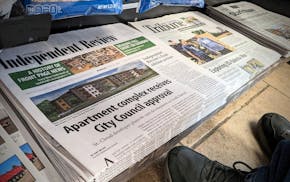Minneapolis needs more trees, more support for businesses interested in sustainability and less enforcement of marijuana-related offenses.
Those were the top suggestions in a month-long survey by the city that drew more than 700 participants and generated more than 200 ideas about how Minneapolis can meet a slate of goals it approved last year.
Most contributors weighed in on the Community Indicators Project online, where they submitted ideas and voted on those posted by others. Some participated in smaller, in-person gatherings in cafes and other meeting places.
Nearly 8,000 votes were cast on the submitted ideas, which ranged from big-picture plans (eliminate homelessness, maintain an educated workforce) to more specific targets (add more heaters to transit stations, provide an online forum to comment on neighborhood meetings.)
Kim Keller, a business process and data analyst for the city, said officials weren't sure what to expect because they'd never tried such a direct route to gathering feedback on city goals.
"This was the first time we used any kind of crowdsourcing technology, and the first time we put some of our most inclusive engagement strategies forward," she said.
The three top suggestions each received more than 100 votes. Some ideas received more negative feedback than positive, including a suggestion that the city stop building protected bike lanes (51 "no" votes); stop spending on climate change work (46 "no" votes); and remove one skyway per year (34 "no" votes.)
Jay Stroebel, deputy city coordinator, said officials will now review all of the suggestions and group them into topic areas. Then, they'll share the results with the heads of city departments or other organizations that have a direct role in planning or funding.
Within the next few months, Stroebel said the City Council will get a more formalized list of recommendations for actual changes that could be made to help achieve the city's goals:
-Living Well (Minneapolis is safe and livable and has an active and connected way of life.)
-One Minneapolis (Disparities are eliminated so all Minneapolis residents can participate and prosper.)
-Hub of Economic Activity and Innovation (Businesses--big and small--start, move, stay and grow here.)
-Great Places (Natural and built spaces work together and our environment is protected.)
-A City that Works (City government runs well and connects to the community it serves.)
"There may be areas where we don't have a very direct impact, but it might be where we need to work with our other community partners, to make progress in a particular area," Stroebel said.

BCA says man pointed pistol-style BB gun at officers before he was shot in Woodbury

In Grand Rapids, Itasca Pride is planning its first event, but there is already pushback

Former diversity worker sues University of Minnesota after firing over swastika photo

